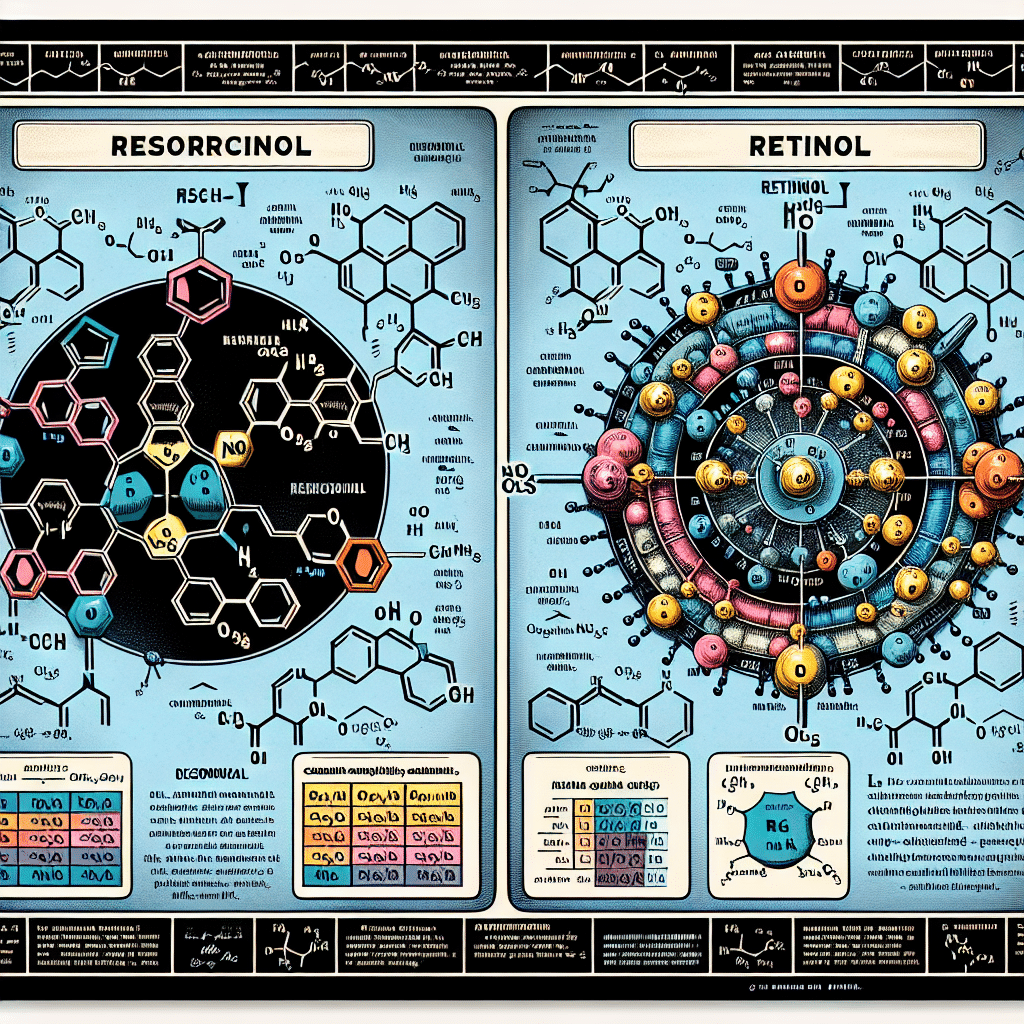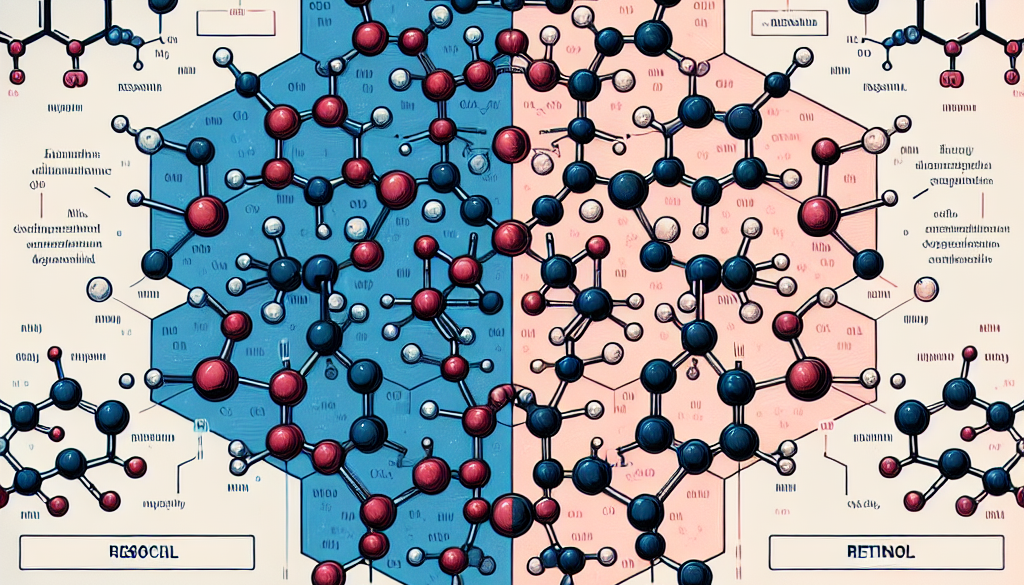Is Resorcinol a Retinol? Comparison
-
Table of Contents
- Resorcinol vs. Retinol: Understanding the Differences
- What is Resorcinol?
- What is Retinol?
- Comparing Resorcinol and Retinol
- Chemical Structure and Function
- Uses in Skincare
- Side Effects
- Effectiveness
- Case Studies and Research
- Choosing Between Resorcinol and Retinol
- Conclusion: Key Takeaways
- Discover ETChem’s Protein Products
Resorcinol vs. Retinol: Understanding the Differences

When it comes to skincare ingredients, the market is flooded with various compounds that promise to deliver miraculous results. Among these, retinol has long been celebrated for its anti-aging and skin-renewing properties. However, another compound, resorcinol, has also made its way into skincare formulations. This article delves into the differences between resorcinol and retinol, their benefits, and their uses in skincare.
What is Resorcinol?
Resorcinol is an organic compound commonly used in topical treatments for acne, eczema, psoriasis, and other skin conditions. It has antiseptic and disinfectant properties, which make it effective in treating skin infections and inflammations. Resorcinol works by helping to remove hard, scaly, or roughened skin.
What is Retinol?
Retinol, on the other hand, is a derivative of vitamin A and is widely recognized for its anti-aging benefits. It promotes skin renewal, enhances collagen production, and can help reduce the appearance of fine lines and wrinkles. Retinol is also effective in treating acne and improving skin texture and tone.
Comparing Resorcinol and Retinol
While both resorcinol and retinol can be found in skincare products, they serve different purposes and have distinct mechanisms of action.
Chemical Structure and Function
Resorcinol and retinol have different chemical structures, which influence their function in skincare. Resorcinol is a dihydroxybenzene, while retinol is a retinoid, which is a class of compounds related to vitamin A. Resorcinol’s primary function is as an exfoliant and antiseptic, whereas retinol’s primary function is as a cell-communicating ingredient and antioxidant.
Uses in Skincare
Resorcinol is mainly used for its ability to treat acne and other skin disorders due to its keratolytic and antiseptic properties. Retinol is used for its anti-aging properties, as well as its ability to improve acne and hyperpigmentation.
Side Effects
Both ingredients can cause side effects if not used properly. Resorcinol can cause skin irritation, redness, and peeling, particularly in higher concentrations. Retinol can also cause irritation, dryness, and increased sensitivity to sunlight. It is important to follow product instructions and start with lower concentrations to minimize potential side effects.
Effectiveness
The effectiveness of resorcinol and retinol varies depending on the skin condition being treated. Resorcinol is effective in removing dead skin cells and improving skin texture, while retinol is effective in reducing signs of aging and improving overall skin health.
Case Studies and Research
Several studies have highlighted the benefits of both resorcinol and retinol in skincare. For instance, a study published in the Journal of Dermatological Treatment found that resorcinol was effective in treating mild to moderate acne. Another study in the Journal of Cosmetic Dermatology reported that retinol significantly improved fine wrinkles when used consistently over a period of 12 weeks.
Choosing Between Resorcinol and Retinol
When deciding between resorcinol and retinol, consider your skin concerns and goals. If you are dealing with acne or rough skin texture, resorcinol may be the better choice. If you are looking to combat signs of aging and improve skin tone, retinol may be more beneficial.
Conclusion: Key Takeaways
In conclusion, resorcinol and retinol are distinct skincare ingredients with different benefits. Resorcinol is an antiseptic and keratolytic agent, making it suitable for treating acne and skin roughness. Retinol is a powerful anti-aging ingredient that promotes skin renewal and collagen production. Both ingredients can cause side effects and should be introduced into skincare routines gradually. It is essential to choose the right ingredient based on your specific skin needs and to consult with a dermatologist if you have any concerns.
Discover ETChem’s Protein Products
If you’re looking for high-quality protein products, ETChem offers a range of collagen-based solutions. Their products are ideal for various industries, including nutraceuticals, pharmaceuticals, and cosmeceuticals. With a focus on quality and customer satisfaction, ETChem’s protein products are an excellent choice for businesses looking to enhance their offerings.
About ETChem:
ETChem, a reputable Chinese Collagen factory manufacturer and supplier, is renowned for producing, stocking, exporting, and delivering the highest quality collagens. They include marine collagen, fish collagen, bovine collagen, chicken collagen, type I collagen, type II collagen and type III collagen etc. Their offerings, characterized by a neutral taste, instant solubility attributes, cater to a diverse range of industries. They serve nutraceutical, pharmaceutical, cosmeceutical, veterinary, as well as food and beverage finished product distributors, traders, and manufacturers across Europe, USA, Canada, Australia, Thailand, Japan, Korea, Brazil, and Chile, among others.
ETChem specialization includes exporting and delivering tailor-made collagen powder and finished collagen nutritional supplements. Their extensive product range covers sectors like Food and Beverage, Sports Nutrition, Weight Management, Dietary Supplements, Health and Wellness Products, ensuring comprehensive solutions to meet all your protein needs.
As a trusted company by leading global food and beverage brands and Fortune 500 companies, ETChem reinforces China’s reputation in the global arena. For more information or to sample their products, please contact them and email karen(at)et-chem.com today.




